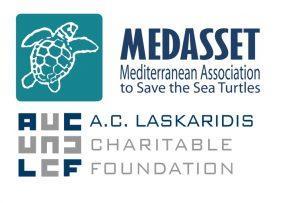October 5, 2020
4/9/2017
PRESS RELEASE
DIVING MISSION IN THE WATERS OFF SALAMIS ISLAND
This year’s third dive of the “Healthy Seas: a journey from waste to wear” initiative took place in the waters surrounding the island of Salamis on Saturday 2nd and Sunday 3rd September. Healthy Seas is a European initiative that is coordinated by MEDASSET in Greece and aims to remove discarded ‘ghost’ fishing nets from the seabed.
The marine ecosystem of the Saronic Gulf may be thought of as falling into four sub-areas: Exterior, Interior and Western Salamis, and the Gulf of Eleusis.
Up until the middle of the 1950s the Saronic Gulf in its entirety was one of the most productive fisheries in Greece. It also served as a breeding ground for many species of fish. However, the extension of the built area of the Attica Basin and the industrialisation of the Thriasian plain put the surrounding waters under pressure and led to the degradation of the habitat.
Eastern Salamis (Interior Saronic) had been seriously affected by these developments, suffering such effects as a sharp decrease in oxygen levels and extensive eutrophication – according to data collected by the Hellenic Centre for Marine Research. However, conditions improved after the Waste Treatment Centre in Psytalleia became operational in 1994, and today it is not unusual to find sea turtles and dolphins in the area. The presence of a wreck effectively means the creation of a new reef that soon becomes a magnet for marine life. Unfortunately, it also attracts ghost nets, the removal of which becomes imperative.
The wreck of steam freighter “AGHIOS MARKOS” (previously “HOMAYUN”) has been lying in the area known as “Kaki Vigla” to the northeast of the island (Interior Saronic), since the afternoon of the 21st April, 1941. The vessel is 376 feet in length, had a capacity of 6,850 tons and was built in 1919. It was Greek-owned, having been acquired in 1929 for the sum of £29,000. Captained by Spyros Kallimanis, it had left the port of Buenos Aires heading for Piraeus, laden with 5 tons of supplies from the Argentinian Red Cross. It had been awaiting permission to enter the harbour when it was repeatedly attacked by German warplanes and sunk.
Three fully manned boats took part in the mission, carrying 7 specialist divers who descended to the wreck that is lying at depths of between 35 and 45m. The mild weather conditions aided the smooth operation of the dive and a total of 500kg of waste nets were salvaged for reuse.
The fishing nets that were successfully brought to the surface had not only been acting as a death trap to the marine organisms of the area, they had also been contributing to the degradation of the Saronic Gulf’s ecosystem, and taking remedial action was judged essential.
The nets will now begin a new life, being reborn as a part of the circular economy, since through the recycling process they will be transformed into the raw material from which new products can be made. They will be turned into premium quality ECONYL® yarn, which in turn is used in the manufacture of brand new items such as socks, swimwear and carpets.
MEDASSET organised the action, which was carried out with the participation of: Ghost Fishing, Ghost Fishing GR, AquaTec Technical Diver Training, The New Raw with Dapne Matziaraki for the Second Nature Project, and Mind the Bump, and made possible by the generous support of the A. C. Laskaridis Foundation.
For more information and interviews please contact:
MEDASSET
George Papaspyrou, +30 210 3613572
[email protected], www.medasset.org
Notes to editors
– Founded in 1988, MEDASSET is an international environmental NGO registered as a charity and limited liability company in the UK and a Permanent Observer-Member to the Bern Convention, Council of Europe. MEDASSET is working closely with MEDASSET Greece – a not-for-profit organisation established in 1993 in Greece, which is a partner to the UN Environmental Programme’s Mediterranean Action Plan (UNEP/MAP). Both organisations are active in the study and conservation of sea turtles and their habitats throughout the Mediterranean. Common goals are achieved through scientific research, environmental education, lobbying relevant decision makers, and raising public awareness.




Comments are closed.